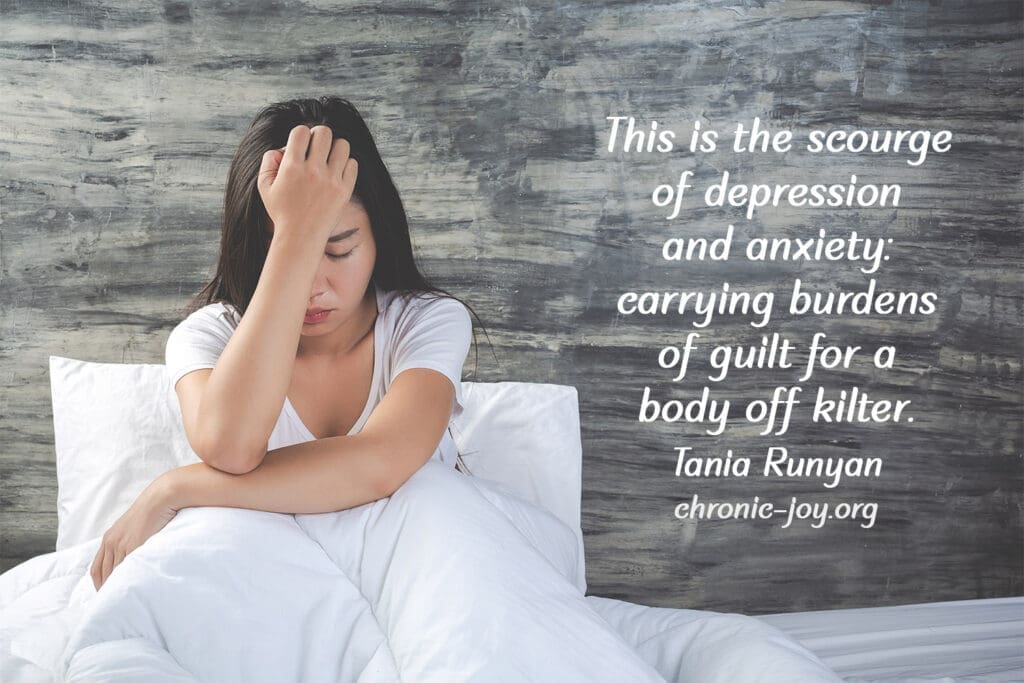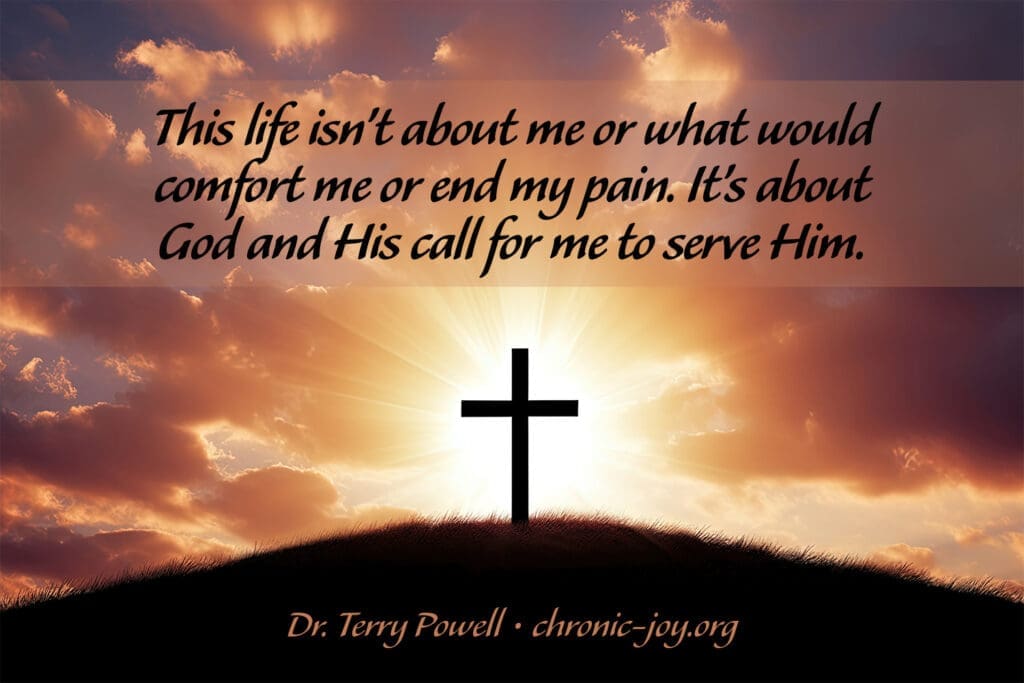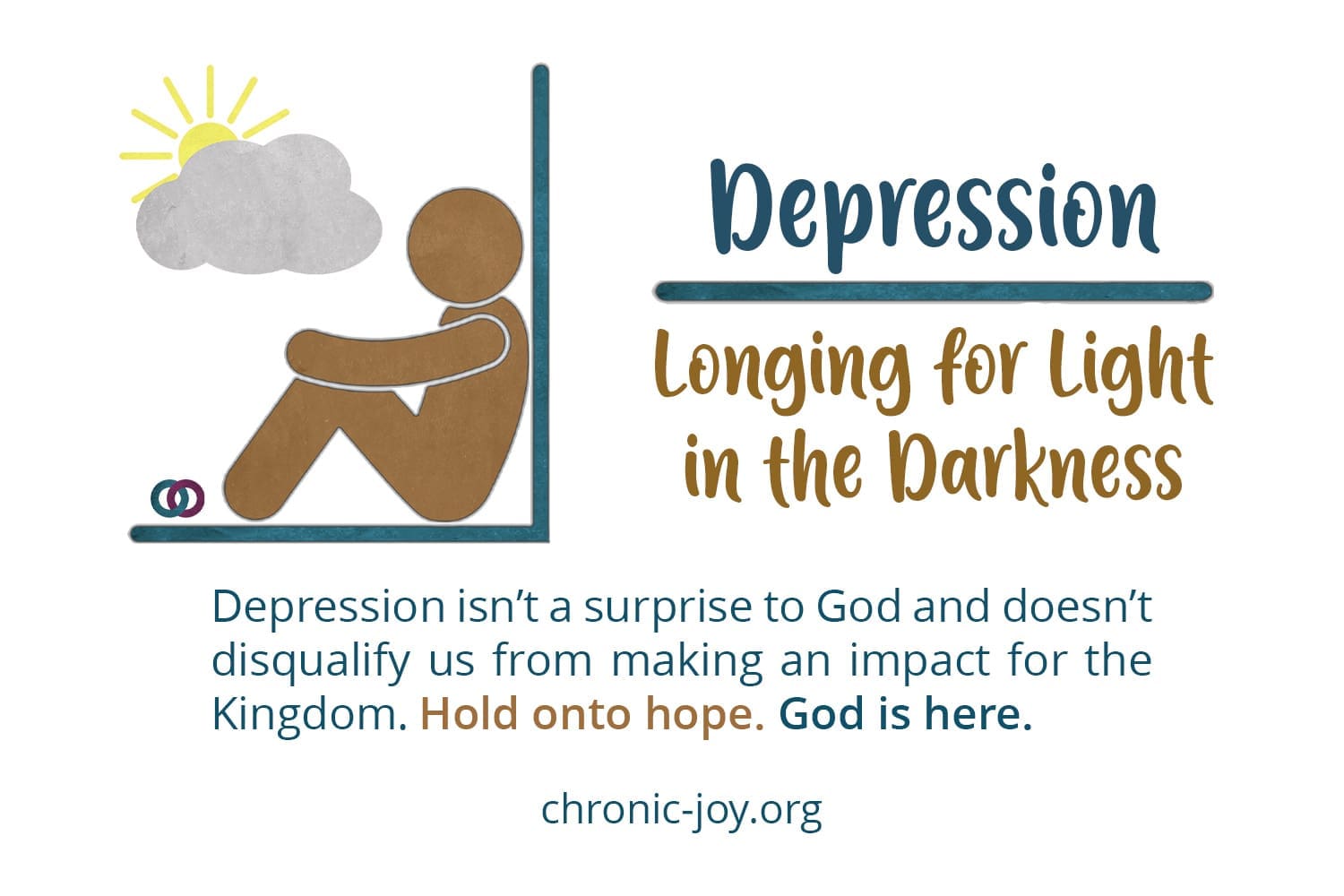
Depression
Longing for light in the darkness.
Depression isn’t a surprise to God and doesn’t disqualify us from making an impact for the Kingdom. Hold onto hope. God is here.
…although I dwell in darkness, the LORD is my light. (Micah 7:8)
Envelope of Hope
REQUEST your free depression resources.
Limit one – US, CA & UK.
IN THE DARKNESS OF DEPRESSION
In the darkness of depression, God is with us even when we cannot feel Him. Certainly, these twelve words from Micah 7:8 are truth we can speak to our hearts when despair eclipses the light: Though I sit in darkness, the LORD is a light for me.
UNLESS YOU GO THROUGH IT YOU DON’T UNDERSTAND DEPRESSION
Michael Wilkes writes, “I thought I knew enough about depression as a pastor seeking to minister to those who had walked through it. I thought I understood their battle. Honestly, I did not have a clue, and to everyone who might read this (unless you have gone through the dark valley personally), you will never fully know what that person is feeling. … Depression isn’t something that jumps on you like a mountain lion in the woods; it is more like an anaconda that slowly chokes the life out of you.”
Symptoms of Depression
- Feeling sad, tearful, empty, or hopeless
- Angry outbursts, irritability, or frustration over even small matters
- Loss of interest or pleasure in normal activities, including intimacy, hobbies, and sports
- Changes in sleep (insomnia or sleeping too much)
- Exhaustion, a fatigue that knocks you off your feet, requiring extra effort for even small tasks
- Decreased appetite and weight loss — or increased appetite and weight gain
- Anxiety, agitation, or restlessness
- Thinking, speaking, or moving slowly
- Feeling worthless or guilty, stuck on self-blame or past failures
- Having trouble thinking, concentrating, making decisions, or remembering things
- Thoughts of death, including suicidal thoughts or attempts
- Physical symptoms such as chest pain, back pain, stomachaches, joint pain, or headaches
HOW PEOPLE DESCRIBE DEPRESSION
- “I feel like I’m walking underwater.”
- “There is a pane of glass between me and everyone else.”
- “Everything seems like it is going in slow motion.”
- “It’s a black hole.”
- “I feel like I’m suffocating and can’t breathe.”
- I’m numb. I don’t feel anything at all.”
- “Everything is gloomy, dark, and lonely.”
- “Depression can feel like a thick fog that clouds your mind, saps your energy, and distorts your reality, so you can no longer see anything good.”
DEPRESSION, LIKE OTHER ILLNESSES, MAY NOT BE HEALED IN THIS LIFE
“Grace relieves but does not always cure depression … Just as a man with asthma or a woman born mute will likely remain this way even though they love Jesus, so our mental disorders and melancholy inclinations often remain with us, too. Conversion to Jesus isn’t heaven, but it’s foretaste. Though substantive healing can come, often it waits till heaven to complete its full work.” (Zack Eswine, Spurgeon’s Sorrows)
“Depression is an illness that affects every part of you – body, mind, and soul.” (Heather MacLaren Johnson, Psy. D.)
When the Darkness of Depression Descends
REMEMBER WHO YOU ARE
You are a child of the Light of the world, a masterpiece created by God for His own great glory. When you cannot feel His Presence, stand on the truth of those who have gone before you: King David, Ruth, Jeremiah, David Brainerd, Charles Spurgeon, and Mother Teresa — and know that in spite of the depression, in the midst of the darkness, maybe even because of the anguish, God is using you and your story.
For God’s invitation is: “Come to me, all you who are weary and burdened, and I will give you rest.” (Matthew 11:28)
God is with us in every situation, circumstance, heartbeat, and breath. We are not alone. Ever.
COMMON MISCONCEPTIONS ABOUT DEPRESSION
There are many misconceptions about depression, but a few are of special significance to Christians.
1. DEPRESSION IS CAUSED BY UNCONFESSED SIN
What is true?
- Studies on mental illness, which include depression, reveal a frequent connection to family history, and approximately 40% of diagnoses are due to genetics rather than external triggers or sinful choices.
- Chronic illness (such as diabetes, thyroid disease, and multiple sclerosis) increases the risk of depression. For many, depression is no more the result of personal sin than a birth defect, cancer, or the flu.
- Godly men and women in the Bible experienced depression. We consider many of these people heroes of the faith. Their laments reveal their strong and abiding faith in God in the midst of anguish and despair.
MENTAL ILLNESS IS A REAL ILLNESS LIKE OTHER PHYSICAL ILLNESSES
David Murray, author of Christians Get Depressed Too, writes, “We would never take this view (sinful cause/spiritual solution) when counseling people with cancer, strokes, broken legs, diabetes or Alzheimer’s. My default position is that physical problems are most likely the result of living as fallen creatures in a fallen world. Why should our default position with brain problems be any different? Are we saying that the brain, the most complex organ in our body, is somehow exempt from the effects of the Fall? Why should we always conclude that brain disorders are the result of personal sin?”
Charles Spurgeon said, “No sin is necessarily connected with sorrow of heart, for Jesus Christ our Lord once said, ‘My soul is exceedingly sorrowful, even to death.’ There was no sin in him, and consequently none in his deep depression.”
2. DEPRESSION IS THE RESULT OF WEAK FAITH
What is true?
- Reputable studies link depression to physical and biological causes
- Many heroes of the faith, including Martin Luther, David Brainerd, and Charles Spurgeon, bore exceptional fruit in the midst of, or maybe because of, their deep depression.
“I was so overborne with discouragement that I despaired of doing any good, and was driven to my wit’s-end; I knew nothing of what to say, nor what course to take. But at last I insisted on the evidence we have of the truth of Christianity … in some measure, and somewhat encouraged to find that God enabled me to be faithful once more.” (David Brainerd)
3. MEDICATION EXHIBITS A LACK OF FAITH IN GOD’S ABILITY TO HEAL
What is true?
“It is a dangerous and damaging misunderstanding that often leads people, especially Christians, to view medication as a rejection of God and His grace rather than a provision of God and His grace.” David Murray, Christians Get Depressed, Too
For someone suffering from severe, recurring depression, anti-depressants are no different than medications for thyroid disease, bleeding disorders, or asthma.
“Grace relieves but does not always cure depression … Just as a man with asthma or a woman born mute will likely remain this way even though they love Jesus, so our mental disorders and melancholy inclinations often remain with us, too. Conversion to Jesus isn’t heaven, but it is foretaste. Though substantive healing can come, it often waits till heaven to complete its full work.” Zack Eswine, Spurgeon’s Sorrows
THE MOST IMPORTANT THINGS TO REMEMBER
You matter.
God is here, present in every moment, every heartbeat, and every breath. He always graciously gives us enough light for the very next step.
We long for light in the darkness — and the Light of the world is here, Immanuel, “God with us.”
Joy is here too, tucked into every difficult, numb, overwhelming, and aching moment of darkness, just waiting to be discovered.
Lastly, Sarah Robinson writes, “[God] isn’t afraid of my depression. He doesn’t shrink from the darkness. God doesn’t lose patience with my pain.”
FREE PRINTABLES
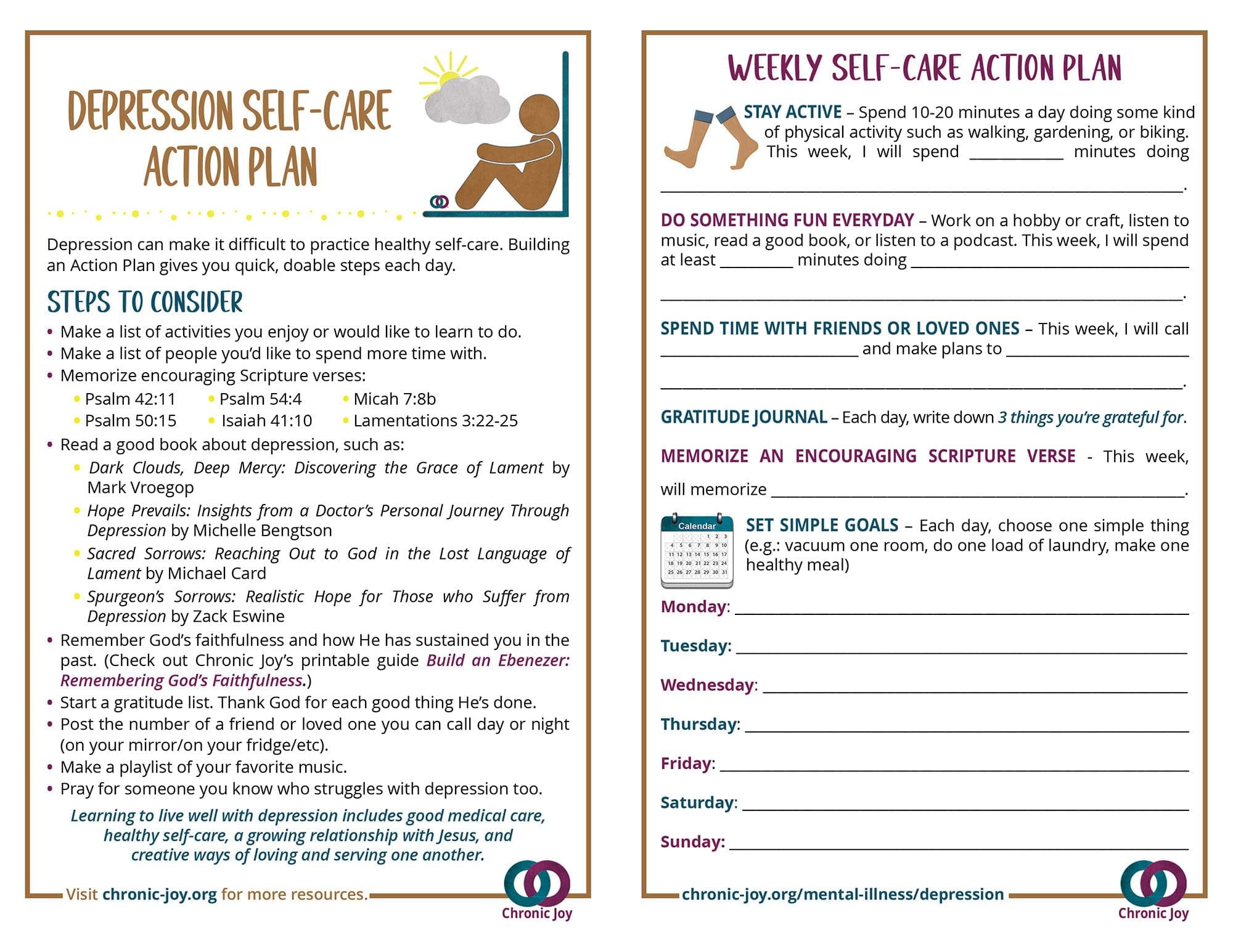
Depression Self-Care Action Plan
Depression can make it difficult to practice healthy self-care. Building an Action Plan gives you quick, doable steps each day.
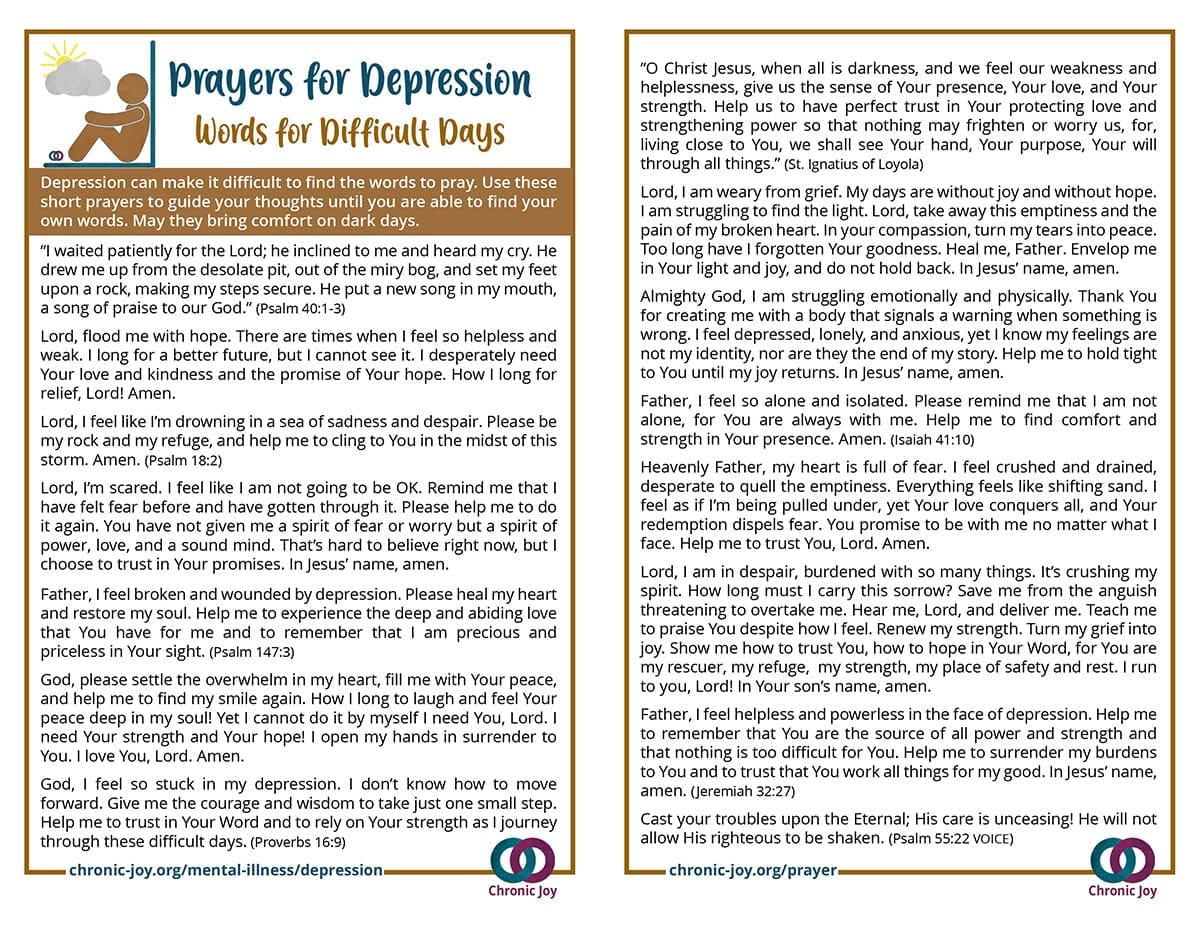
Prayers for Depression
Depression can make it difficult to find the words to pray. Use these short prayers to guide your thoughts until you are able to find your own. May they bring comfort on dark days.
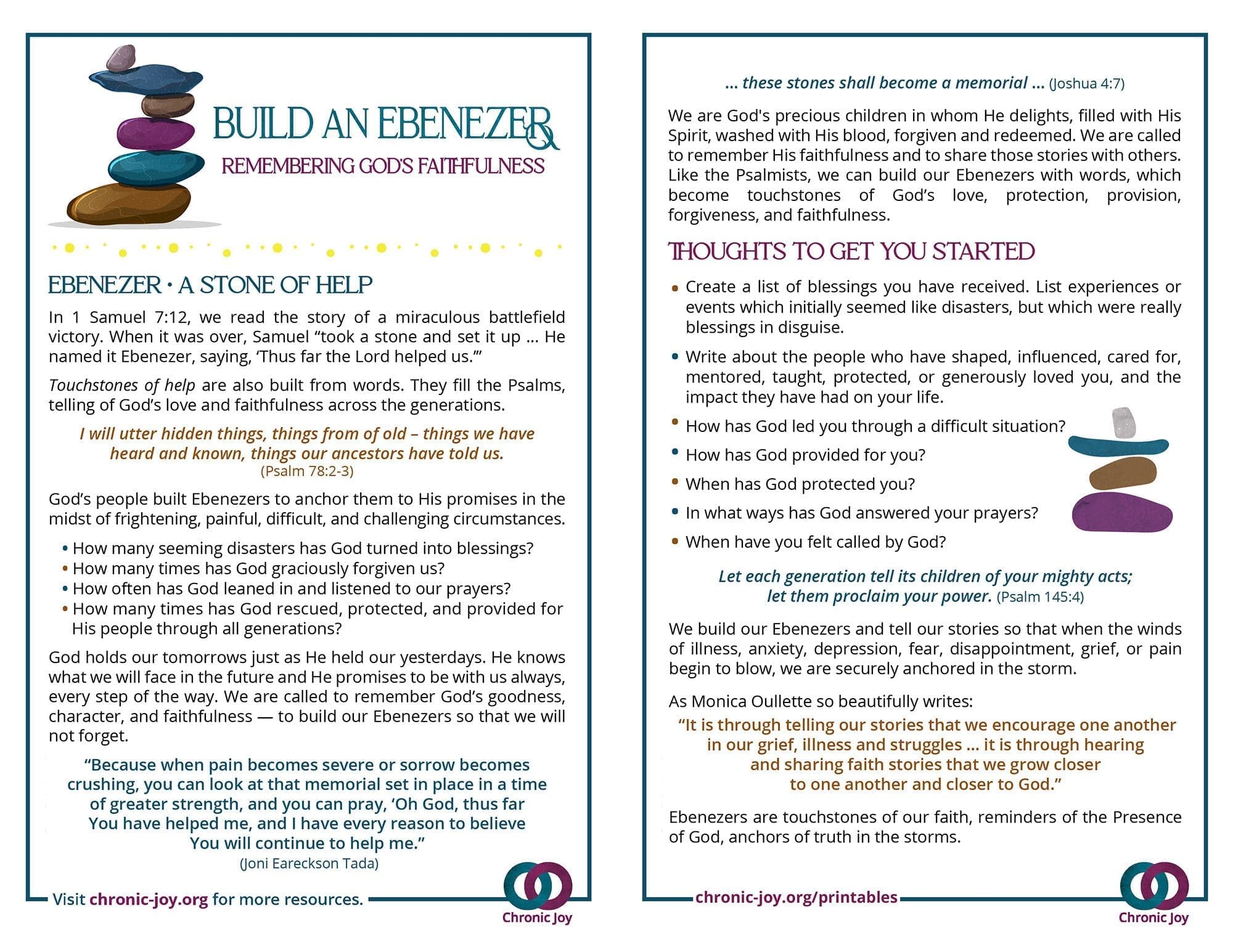
Build An Ebenezer
Remembering God's Faithfulness
God’s people built Ebenezers, touchstones of help, to anchor them in truth in the midst of frightening, painful, difficult, or challenging circumstances.
POSTS
In the Marrow of Depression and Anxiety
Today, I am writing from within the marrow of depression and anxiety when I have no answers, poignant quotations, or anything beautiful to say. I do know this: I'vehad the window open, istening on one of the first warm spring days. By the time you read this I will have almost forgotten about today.
A Reason Not To Take My Own Life
What keeps me from following through on suicidal thoughts - other than the grace of God - is the pain I would cause my loved ones...
3 Things to Remember
1. FAITH IS NOT A FEELING
Depression often makes us question whether or not God is faithful. Yet even when we cannot feel His Presence, even when we doubt His love, or question His faithfulness, God remains steadfast and true.
If we are unfaithful, He remains faithful, for He is not able to deny Himself! (2 Timothy 2:13)
2. REMIND YOURSELF OF WHAT IS TRUE
Depression can make it difficult to think straight. Reminding ourselves of what is real and what is true gives us solid ground to stand on.
Finally, brothers and sisters, fill your minds with beauty and truth. Meditate on whatever is honorable, whatever is right, whatever is pure, whatever is lovely, whatever is good, whatever is virtuous and praiseworthy. (Philippians 4:8)
3. SPEND TEN MINUTES A DAY IN NATURE
There are so many benefits of stepping out into creation:
- Decreased cortisol levels
- Increased self-esteem
- Decreased depression
- Increased serotonin levels
- Decreased stress
- Increased mental focus
- Increased desire to interact with others
But ask the beasts, and they will teach you; the birds of the heavens, and they will tell you; or the bushes of the earth, and they will teach you; and the fish of the sea will declare to you. Who among all these does not know that the hand of the Lord has done this? In his hand is the life of every living thing and the breath of all mankind. (Job 12:7-10)
7 Ways to Help a Loved One
1. LISTEN WITHOUT OFFERING ADVICE
There is a time to be silent and a time to speak. (Ecclesiastes 3:7b
2. OFFER YOUR HELP IN SPECIFIC WAYS
Such as: “I’m at the grocery store. Is there anything I can pick up for you?” or “I know things are overwhelming right now, what can I take off your to-do list?”
… serve one another humbly in love. (Galatians 5:13
3. RESEARCH CARE AND SUPPORT OPTIONS
Help your friend create a list of mental health providers, support groups, books, websites, and podcasts. Offer to help your loved one navigate insurance, fill out medical forms, and schedule appointments.
Carry each others burdens, and in this way you will fulfill the law of Christ. (Galatians 6:2)
4. KEEP INVITING YOUR FRIENDS AND LOVED ONES
Remind them that it’s OK if they have to cancel at the last minute. Tell them that you care and that you’re not going anywhere.
Therefore, my beloved brothers and sisters, be firm, immovable, always excelling in the work of the Lord, knowing that your labor is not in vain in the Lord. (1 Corinthians 15:58)
5. CREATE A LIST OF EMERGENCY CONTACTS
Create a list of crisis hotlines, emergency response services, and friends or loved ones who will answer a call day or night. Hang it in a prominent and visually-accessible place — and make a copy for yourself.
When you go through deep waters, I will be with you. When you go through rivers of difficulty, you will not drown. When you walk through the fire of oppression, you will not be burned up; the flames will not consume you. (Isaiah 43:2)
6. ENCOURAGE YOUR FRIEND OR LOVED ONE
Send an “I’m thinking of you!” email. Call or text every few days. Remind them in many ways how much they matter and how much you care.
The eternal God is your refuge, and underneath are the everlasting arms. (Deuteronomy 33:27)
7. INVITE YOUR LOVED ONE TO DEVELOP A DEPRESSION SELF-CARE ACTION PLAN
Help them identify and practice healthy self-care. Building an action plan provides quick, concrete steps each day. Our free printable makes it easy.

